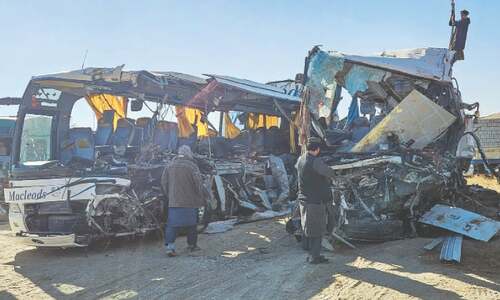BANGKOK, Oct 8: Thailand’s worst street violence in 16 years has already started to hurt the lucrative tourist industry and will do nothing to help an economy feeling the effects of the global credit crisis, tourism officials and analysts said.
Two people died and over 400 were injured on Tuesday when police clashed with demonstrators intent on toppling the government. That ended a period of comparative calm after a short state of emergency in response to previous unrest in September.
“Bookings have recovered since the lifting of the emergency rule. But there have already been some cancellations from Asian travellers since the incident yesterday,” said Apichart Sankary, president of the Association of Thai Travel Agents.
“The impact is unavoidable, but the extent of the damage depends on how the situation ends ...Will it be a happy or a painful ending? Of course, another coup will be bad,” he added.
Thailand had a military coup in September 2006. An elected government that took office at the start of this year has been contested in the streets since May.
Apichart said there were no additions to the list of countries that issued travel warnings because of emergency rule.
However, Thai Airways International said on Wednesday that it would cut flights to Asian countries from next week because of a fall in passenger numbers due to the political unrest and the global financial crisis.
Thais have also been less willing to leave home because of the trouble.
“Yesterday’s events were real sad,” said Maiyarat Pirayakoset, president of the Association of Domestic Travel.
“Domestic travel has recovered to 60 per cent of normal since the emergency was lifted. But new bookings after the clashes are a worry, especially because we are in the money-making high season.”
Thailand is banking on 600 billion baht ($17.4bn) in revenue from 15.5 million tourist arrivals this year. The sector directly employs 1.8 million people and brings in the equivalent of 6 per cent of gross domestic product.
DOING ALL RIGHT: Business seemed to be holding up in Bangkok’s Khao San Road, a popular destination over the years for low-budget tourists and not very far from parliament, where Tuesday’s clashes occurred.
“It’s not as crowded as before. But we’re doing all right, we still have new bookings despite some cancellations,” said guest house owner Thongchai Nonthaleeluk.
Home to some of Asia’s best beaches, Thailand has remained a top tourist draw despite the SARS epidemic, the Indian Ocean tsunami, bird flu and the 2006 coup.
But the long-running protests have hurt, and the appointment of new Prime Minister Somchai Wongsawat last month has done little to help, despite his initial talk of reconciliation.
“People had hoped things would get better after we had a new premier. But the clash is taking us to the same old political situation,” said Aat Pisanwanich, head of international trade studies at the University of the Thai Chamber of Commerce. “Nobody knows what will happen and that’s hurting confidence and the economy,” he said.
Consumer confidence in August was already at its lowest this year.
In September the Chamber of Commerce said the political turmoil, if prolonged for another month, could cost the economy as much as 62 billion baht and might drag growth below 5 per cent this year after 4.8 per cent in 2007.
Foreign investors have sold a net $3.8 billion of Thai shares this year, and the value of foreign investment applications slid 44 per cent in the first eight months compared with a year earlier to 179 billion baht, according to the Board of Investment.—Reuters














































Dear visitor, the comments section is undergoing an overhaul and will return soon.